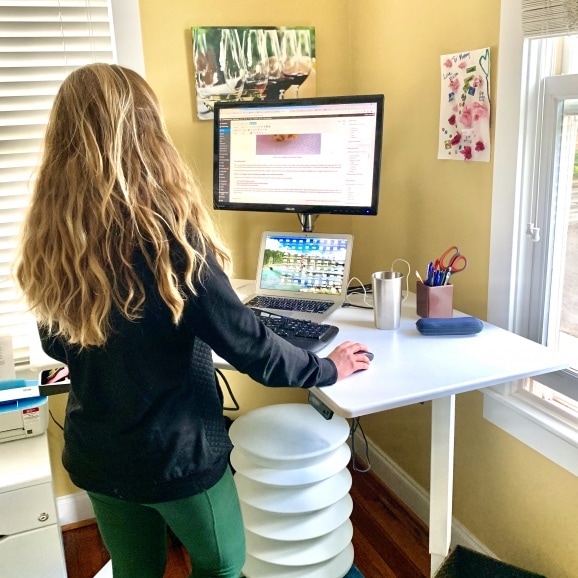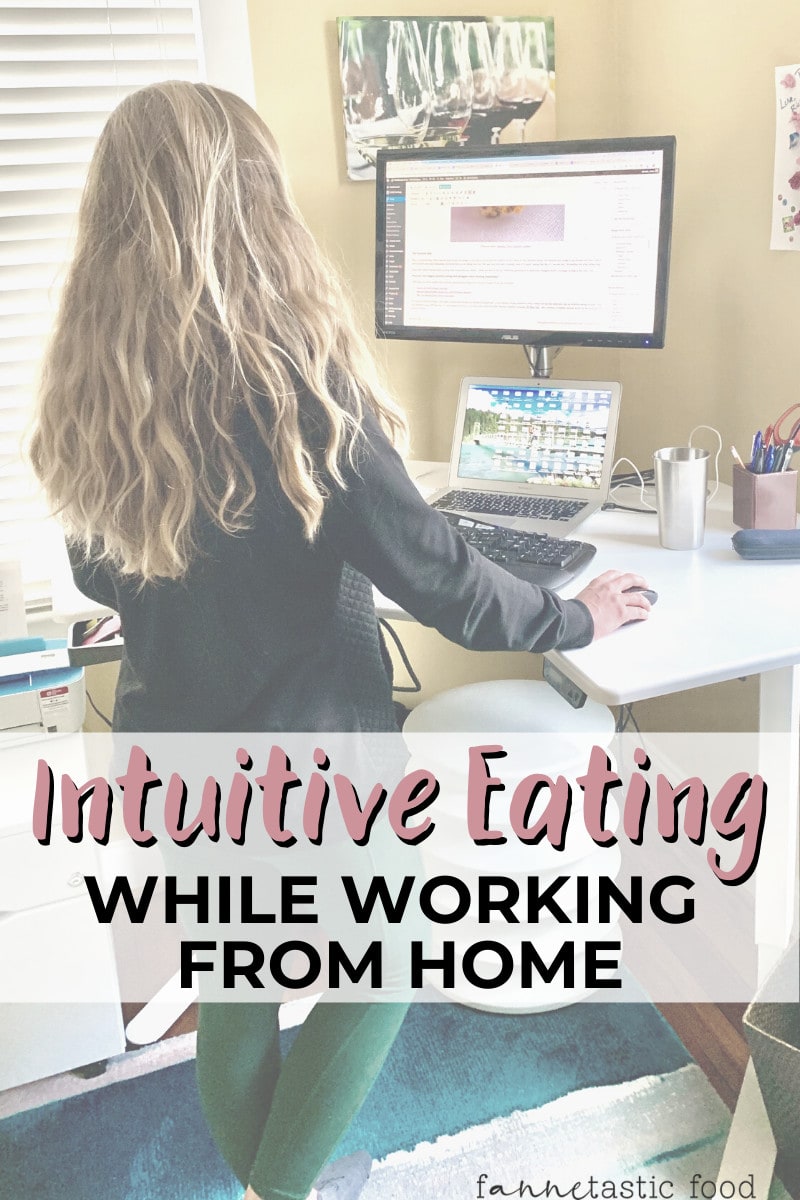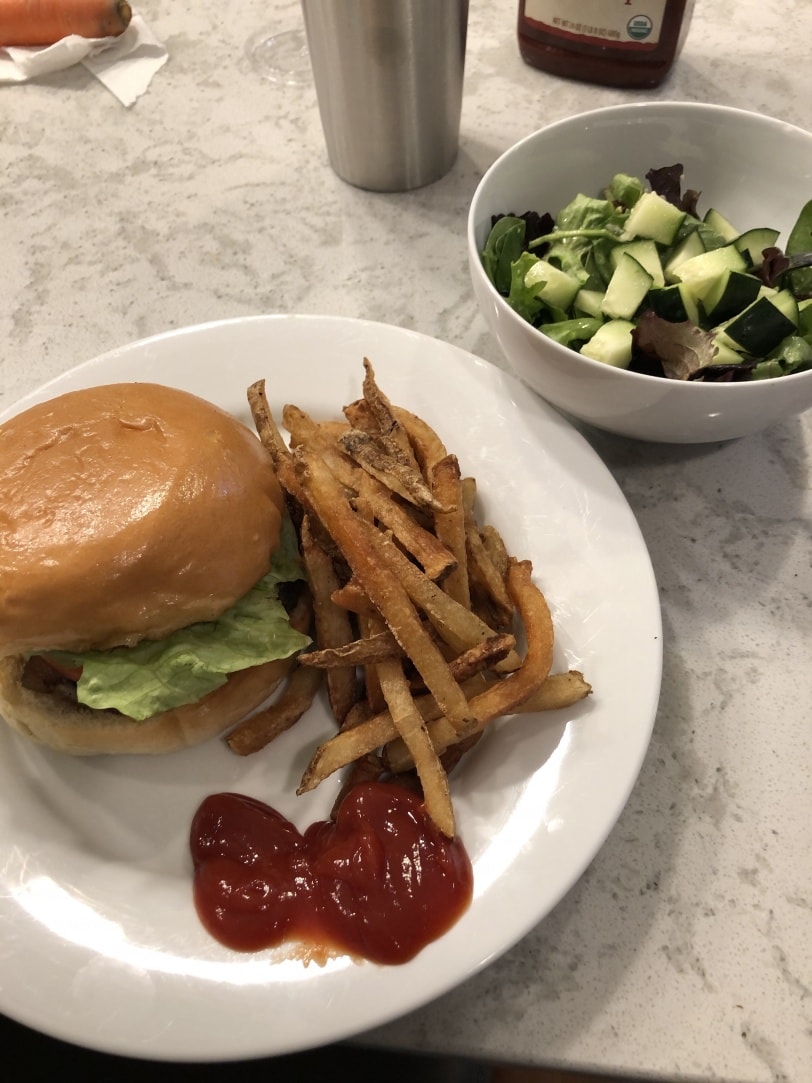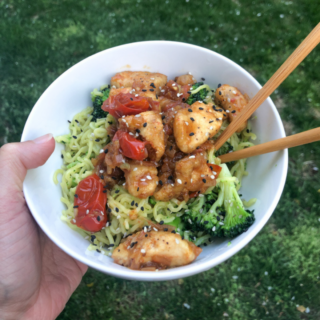I’ve been working from home on and off for 10 years now, and while I certainly don’t have this whole working from home thing all figured out (especially with a toddler in the mix), I do know that going from working in an office full time to suddenly strolling over to the computer in your pajamas every day is a BIG change.
And that big change can throw a lot of our eating routines out the window. If you are struggling with finding a food routine that works for you, I hope this post on intuitive eating while working from home – or while chasing kids around at home – will be helpful.
5 Simple ways to practice intuitive eating while working from home
- Stop judging your food choices
- Stick your usual food schedule (ish)
- Practice mindful eating by taking a break from work to eat
- Listen to your body – honor your hunger and fullness cues
- Feel your feelings to avoid emotional eating
Much more on each of these below.
But first, what is intuitive eating?
For those who aren’t familiar with it, intuitive eating is an anti-diet approach that brings you back to eating as you did when you were a little kid, before dieting got involved: eat when you are hungry, stop when you are full.
It’s an approach that sounds remarkably simple, but for anyone who has done diets in the past it can actually be quite hard to get used to, because you will be fighting against the idea that there are “good” and “bad” foods and that you should feel guilty if you’re not eating perfectly all the time.
Diet culture sucks people in by making them believe that their intuition – their own bodies – can’t be trusted. Diet culture also tells us that if we just lose xx pounds, or just get that smaller pant size, then everything in our life will be amazing.
These messages can be tough to fight against, and if this is something you are working through I’d encourage you to see a therapist (many are working virtually now) as well as a dietitian that can help you on your intuitive eating journey.
(Related: I offer a 6 week intuitive and mindful eating virtual program for those interested in working to build healthier relationships with food and their bodies.)
Why is intuitive eating worth it?
Health benefits of intuitive eating
There is a multitude of studies touting the clear health benefits of intuitive eating. They include:
- Improved self-esteem and mental health
- Lower levels of stress
- Increased energy levels
- Decreased occurrences of eating disorders
- Better body image
And now, here are my top tips for enjoying food and stressing less while working remotely.
1. Stop judging yourself for your food choices
At a time when so many things are out of our power, it can be tempting to “control” not only our food choices but the choices of others as well. Avoid listening to the food police (whether it be your inner voice, a family member’s, or a friend’s). You are neither “good” or “bad” for eating a certain way. Food does not hold a moral value.
It is also important to remember that there is no perfect way of eating – while working from home or otherwise – and our body’s needs are constantly changing. Intuitive eating is all about eating the foods you love and that make you feel good physically and mentally in that moment – and what food makes you feel good will change on a day to day (and hour to hour!) basis.
Some days you will be craving a veggie-filled kale salad and others you will want to eat a slice (or three) of your favorite pizza. Some days you might want both! Either way, it’s a great choice because you are listening to your body.
Have you ever noticed how if you have a food craving and you ignore it, it just comes back stronger later?
A lot of my AnneTheRD nutrition clients come to me saying that they can’t control themselves around their favorite foods – they talk a lot about how when they do eat something they deem to be a splurge or off limits they have a really hard time stopping and may even binge on it. As a result, they try even harder to avoid those foods because those foods make them feel out of control and like a failure, which makes the situation worse because they are giving the food more and more power over them. (Remember that diet culture loves to make us think we can’t trust ourselves, and that we have to have a diet to fix us.)
If something is off limits, you will want it way more. And when you do eventually have it (because you can’t avoid certain foods forever), you will most likely binge on it because there’s that feeling of “oh, screw it, I’ve already had this and ruined everything so I might as well just go to town on it now.” Or “I’ll never eat this again after tonight so I better have ALL of it.”
Ironically, when my clients intentionally and mindfully eat a food that they had placed off limits for a long time (and binged on occasionally), they sometimes find they don’t even LIKE that food. They realize they just wanted it because they couldn’t have it, and then once they started eating it they felt out of control and just kept going without even tasting it or paying attention because they were so checked out.
When you eat intuitively, and truly allow yourself to have what you want when you want it, you stop feeling shame around food choices and you can reintroduce foods into your life that you previously thought you had to avoid.
2. Stay on your usual schedule (or as close as possible) when working remotely
If you’re new to working remotely you may have noticed that it feels quite freeing to be able to work in your sweatpants and go whip up a tasty snack whenever you feel like it (…at first!). Until, that is, you realize that you’ve completely forgotten to eat lunch because you’ve been wandering back and forth to the kitchen for snacks all morning, or maybe you realize that it’s 2 p.m. and you never stopped for lunch OR a snack and now you’ve gotten way too hungry.
Obviously for those of us working from home with kids, things are very chaotic and all over the place right now, and I’m sure you’re probably laughing/eye rolling at the whole “stay on your usual work schedule!” thing. I get it, friends, I do. I am right there with you.
BUT.
Staying on top of your hunger is incredibly important. Not only will fueling before you get too hungry stave off the hangry emotions (I know I’m not alone in getting super irritable when hungry), but it will also make it much easier to eat mindfully and to stop before you are overfull.
Not staying on top of my hunger is something that I struggle with personally, especially ever since having my daughter Riese. Fellow parents know things tend to get very hectic and before you know it you’re starving but you’re trying to tend to your child’s needs or in the middle of something and you just can’t always eat when you need to.
But take it from me, friends: feeding yourself is just as important as feeding your child, and everyone will be happier for it.
Whether you are holed up in a home office/closet or running after kids all day, take the time to set a (loose) schedule for yourself in terms of snacks and meals for your day. This will benefit your kids, too, because I’m sure you fellow parents know our kids get just as hangry as we do – I can always tell when it’s time for a snack break because Riese starts getting extra fussy. It’s the same for us, even though we are (usually) better at hiding it.
Honor your hunger and plan snack/meal breaks on a frequent basis. If you are at your computer, set a calendar reminder so you don’t get distracted and miss your prime fueling window.
3. Practice mindful eating by taking a break from work
When you decide you are hungry, take a break from your work while you eat. It’s hard to enjoy and focus on our food if we aren’t paying attention to it, right?
If you’re working from home or the office, I know how tempting it is to continue working and eat your meal at your computer instead of taking a dedicated lunch break.
And if you’re chasing kids around all day, I know it’s often easier to think: “I’ll just eat later when things are less crazy and let the kids eat now.” Again, I’ve been there.
But setting time aside to enjoy your meal without technology distractions will prevent you from mindlessly inhaling your food. A distracted eating study showed that those who work and eat at the same time not only ate faster and couldn’t remember what they ate, but also reported feeling less full than the non-distracted eaters.
Take time to notice how your food tastes, how it feels in your mouth, the aroma, what it looks like, and stop when you are satisfied.
Read my intuitive eating guide for more on how to slow down and practice mindful eating, and here’s a blog post I wrote with more research on the importance of meal breaks: Why You Need to Take a Lunch Break.
(Pictured above: my super easy Quinoa Taco Salad)
4. Listen to your body – honor your hunger and fullness cues
Your body is incredibly smart – trust your body and honor its biological needs. If you’ve spent years on diets or are accustomed to ignoring your hunger and fullness cues, this can often take some time to get used to, and it may be helpful to ask yourself some questions to check in.
Like: how hungry am I right now? Am I meal hungry or snack hungry? This one is huge for me – if I try to just have a snack when I’m hungry enough for a full meal, it always backfires and leaves me snacking endlessly but never really feeling satisfied.
Another question to ask: am I hungry or just thirsty?
And: do I actually just need a break vs. food?
If you are hungry, eat. Enjoy the experience of eating, then take notice of when you are beginning to feel full.
5. Feel your feelings to avoid emotional eating while working from home
During this time you may be anxious, bored, lonely, angry, sad, scared, etc., while adjusting to this “new normal” of working from home. I want you to know that it’s okay and completely normal to feel really weird right now. Are you grateful to still have a job? Of course. But you are still allowed to feel anxious or upset.
Here’s the thing: it’s perfectly okay to eat emotionally sometimes. But we need to make sure that emotional eating (or drinking) is not our only (or our primary) coping mechanism. It’s important to acknowledge our feelings without constantly using food as a mask for deeper emotional issues.
Ask yourself: what is this really about? And what is it I really need right now? There may not be a way to fix the problem, but acknowledging it is important.
Is there something that will make you feel a little better that doesn’t involve food? To give you some ideas/a place to start, I like this 5-5-5-5-5 exercise.
If you’re sad and hungry and you feel that eating a cookie will truly help cheer you up, that’s okay too, and you can do that while practicing intuitive eating. Just be sure to really tune IN to the cookie eating experience vs. using it to tune out/numb.
Take the time to sit with yourself, recognize why you feel that way, and then really enjoy that cookie. The key here is to listen to your body and use the mindfulness techniques that I mentioned earlier.
(Pictured above: Oatmeal Dark Chocolate Cookies)
The bottom line
This is a stressful time. There may be days you get too hungry or too full or turn to food for comfort or can’t listen to your intuitive eating cues because your fridge is not stocked and that’s OKAY. Or maybe you’re working til midnight every night because you have kids and no childcare and the last thing you can even think about is intuitive eating. That’s okay, too.
Give yourself grace and compassion and know that you are doing your very best and your very best is enough, even if it doesn’t always feel like it. I see you and I’m sending you a big virtual hug.
I hope this intuitive eating while working from home post was helpful – please feel free to ask any additional questions or to share your thoughts below. I’m happy to help in any way I can!
What are your biggest intuitive eating food struggles when working from home?
I will leave you with a couple other intuitive eating focused blog posts of mine to explore if you are interested:
- How to Get Rid of Sugar Cravings
- Because Being Healthy Means Not ALWAYS Being Healthy
- Why You Should Throw Away Your Scale
- What Time Should You Stop Eating?
For more on intuitive eating, I also highly recommend reading the Intuitive Eating book! The 4th edition is being released in June, which will include some new added tips on intuitive eating for kids – you can preorder it here (affiliate link). I’d also suggest listening to my friend and fellow non-diet Dietitian Heather’s podcast, RD Real Talk – she’s currently airing a multiple episode series on the principles of intuitive eating.











